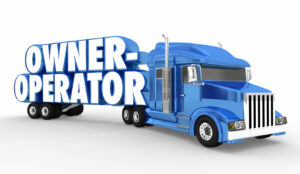Owner-operators in the trucking industry have become the primary source of achieving financial independence. With innovative business strategies, drivers have a direct path to their futures as independent drivers. Learn how to become a successful owner-operator today.

Owner-Operator Trucking
In the owner-operator world, this involves owning and operating your commercial truck through a small trucking company or as a sole proprietor. Instead of being considered an employee for a larger trucking company, owner-operators can make business decisions, select the type of freight they want to haul, and choose their own routes.
Owner-Operator Benefits
When you become a successful owner-operator, the benefits are endless. In the beginning, it may be a struggle. But once you get on your feet, you will see that being an owner-operator opens many doors to success.
Financial Independence: Owner-Operators can earn a higher income than company drivers. You can control your rates, income streams, and expenses.
Flexible Scheduling: You can also choose your own work schedule, which helps balance work and life. You can choose a schedule that allows you to spend more time with family and friends. Never miss out on big moments with your loved ones.
Freight Choice: You can choose the type of freight you haul, whether heavy haul or hazmat.
Tax Benefits: As an owner-operator, you can take advantage of tax deductions for your business expenses. These deductions can include maintenance, fuel, insurance, and more.
Owner-Operator Challenges
As mentioned above, becoming an owner-operator is not always easy; there are some challenges drivers can face when starting up or while out on the road.
Start-Up Costs: Purchasing a commercial truck tends to be the most expensive of your start-up costs. Some financing options may help you budget for your new truck.
Business Management: As an owner-operator, you must handle all administrative tasks, including taxes, bookkeeping, and paperwork related to your business. Some owner-operators will outsource these tasks, but you can do it yourself to save on expenses.
Income Flexibility: Your income can change due to factors including fuel prices, market demands, and unexpected expenses. Owner-operators should have financial planning and savings for these periods.
Compliance and Regulations: Understanding and navigating safety standards, regulations, and compliance is important for owner-operators to avoid penalties and maintain a reputable business.
Tips on Being a Successful Owner-Operator
To be a successful owner-operator, there are some tips you can follow.
Training and Education: As an owner-operator, it is your responsibility to stay updated on any industry regulations, trends, and best practices with training and education programs.
Networking: You should build relationships with other brokers, truck drivers, and transportation industry professionals. This is considered networking and can lead to solid partnerships and other opportunities.
Time Management: Establishing good time management skills can help optimize your rest breaks, driving times, and delivery schedules.
Customer Service: Giving customers excellent customer service often leads to repeat business and future referrals. As an owner-operator, you should know how to communicate properly with all customers, brokers, and shippers.
The road to success for an owner-operator attracts the promise of independence and financial benefits, but it also calls for commitment, resilience, and careful planning. Promising owner-operators can guide their way to a successful and satisfying career on the open road by understanding all aspects of the business, quickly addressing challenges, and embracing possibilities for growth.

